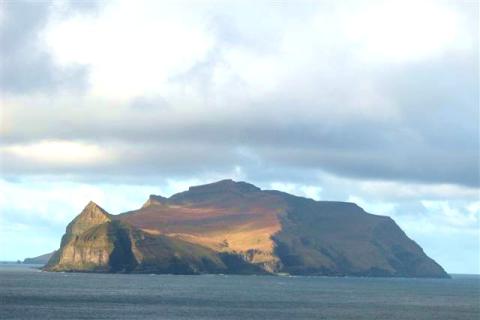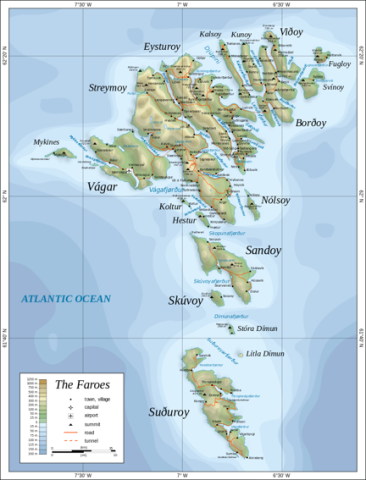[1] Cum autem nāvigāssent iuxtā illam īnsulam ubi erant per trīduum anteā, et vēnissent ad summitātem illīus contrā occidentem, [2] vīdērunt aliam īnsulam, prope sibi iūnctam, interveniente fretō nōn magnō, herbōsam valdē et nemorōsam, plēnamque flōribus; coepērunt quaerere portum per circuitum īnsulae. [3] Porrō nāvigantibus contrā merīdiānam plāgam eiusdem īnsulae, invēnērunt rīvulum vergentem in mare; ibi nāvim ad terram mīsērunt.
[4] Ascendentibus illīs dē nāvī, praecēpit Sānctus Brendānus ut nāvim per fūnēs contrā alveum flūminis trāxissent, quantum plūs potuissent. [5] Erat autem illud flūmen tam lātum sīcut et lātitūdō illīus nāvis. Praedictus pater sedēbat in nāvī; et ita fēcērunt per spatium ūnīus mīliāriī, usque dum ad fontem vēnerant eiusdem flūminis.
notes
The Island (Paradise) of Birds. They sail past the Island of Sheep and come to another island very close to it. This island is lush with trees and grass and flowers, and they find a good landing place where a river flows into the sea. They pull the boat up river to its source. (It is still Easter Sunday).
[1] iuxtā illam īnsulam ubi erant per trīduum ante: they went past the “Island of Sheep” (chapter 9); they had stayed there from Maundy Thursday to Holy Saturday, three days counting inclusively. They were alongside the island, but still on the boat.
et vēnissent ad summitātem illīus contrā occidentem: i.e. they sailed to the western tip of the island.
[2] vīdērunt aliam īnsulam, prope sibi iūnctam, interveniente fretō nōn magnō: I assume this is "another island," the īnsula contrā occidentālem plāgam, quae vocātur Paradīsus Āvium of 9.20. prope sibi iūnctam: “almost joined to it (the first island).”
per circuitum: “by means of a circuit,” i.e., by circumnavigating the island.
[4] contrā alveum flūminis: “against the riverbed,” i.e. “upstream.”
quantum plūs potuissent: “as much as they could”; CL would probably omit plus (OLD quantum2 3a).
[5] tam lātum sīcut et lātitūdō illīus nāvis: “just as wide as in fact (was) the width of that ship.
Praedictus pater: Brendan.
et ita fēcērunt: Brendan’s followers kept on pulling (see 11.4).
vocabulary
| nāvigō nāvigāre nāvigāvī nāvigātus | to go by ship, sail; to row 1 |
| iūxtā | next to (prep. + acc.) |
| per | through; by means of [OLD 14] |
| trīduum –ī n. | three days |
| anteā | before, formerly |
| summitas –ātis f. | top; surface [OLD 2] |
| contrā | against; towards, in the direction of [OLD 14a] |
| occidēns –entis | the west (the land of the setting sun) |
| interveniō –venīre –vēnī –ventum | to come between, intervene 2 |
| fretum fretī n. | straight, channel |
| herbōsus –a –um | grassy |
| valdē | powerfully; intensely, exceedingly |
| nemorōsus –a –um | woody |
| portus portūs m. | harbor |
| per | through; by means of [OLD 14] |
| circuitus –ūs m. | circuit, circle; outer edge, perimeter [OLD 5] |
| porrō | next 3 |
| nāvigō nāvigāre nāvigāvī nāvigātus | to go by ship, sail; to row |
| contrā | against; towards, in the direction of [OLD 14a] |
| merīdiānus –a –um | southern [OLD 2] |
| plaga –ae f. | open expanse, tract; region |
| rīvulus –ī m. | a small stream, brook |
| vergō –ere | to move as on a downward slope, sink |
| mittō mittere mīsī missus | to send, let go; to thrust; to put [OLD 13] |
| per | through; by means of [OLD 14] 4 |
| fūnis fūnis m. | rope, line |
| contrā | against; towards, in the direction of [OLD 14a] |
| alveus –ī m. | cavity; riverbed, channel |
| lātitūdō lātitūdinis f. | breadth 5 |
| praedīcō praedīcere praedīxī praedictus | to say beforehand; mention |
| faciō facere fēcī factus | to do, make; to act, conduct oneself [OLD 28] |
| per | through; by means of [OLD 14] |
| spatium spati(ī) n. | space; expanse [OLD 3] |
| mīliārium –(i)ī n. or mīliārius –(i)ī m. |
a thousand paces, a mile [OLD 1c] |
| ūsque | until (often with ad or dum) |


